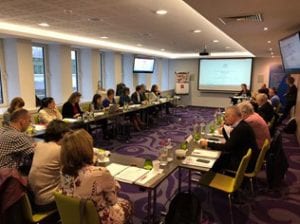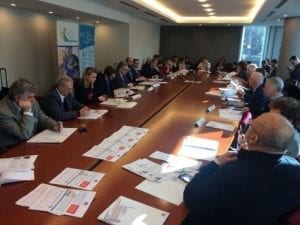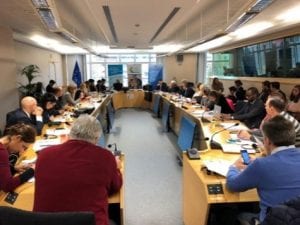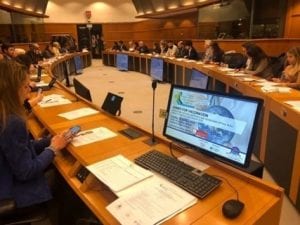
The involvement of civil society actors in discussions around vaccination is crucial. Cittadinanzattiva’s Mariano Votta and Daniela Quaggia outline their work in this area.
Vaccine hesitancy – the reluctance or refusal to vaccinate despite the availability of vaccines – threatens to reverse the progress that has been made in tackling vaccine-preventable diseases. For this reason, vaccine hesitancy has been identified by the World Health Organization (WHO) as being among the 10 issues that will demand worldwide attention in the coming years. Mainly to address these and other threats, 2019 saw the start of the WHO’s new five-year strategic plan – the 13th General Programme of Work.1
In addition to the commitment of institutions and the various stakeholders, civil society also needs to be mobilised. However, there are questions that need to be asked:
- How much impact does the lack of adequate health literacy have?
- What could the contribution of civil society be in reducing vaccine hesitancy?
- How can we involve citizens’ organisations?
- What characteristics should a message on vaccines have in order to be effective?
In this article, we look at citizens’ engagement on vaccination: from the analysis of a concrete experience promoted at the EU level by a citizen organisation, to the pathway that needs to be followed in order to increase the number of citizen organisations dealing with vaccine hesitancy across Europe, and to improving the awareness of the importance of vaccination amongst EU citizens.
Vaccination is a right
Vaccination is a right and an extraordinary public health tool which must be understood, valued, disseminated, and utilised in the interests of individuals and the community. However, for this to be achieved it is necessary to develop a proper vaccine culture and, indeed, to ensure rigour and transparency, which will result in the confidence in science that seems to have been lost.
Cittadinanzattiva – Active Citizenship Network (ACN)2 is deeply committed to raising awareness around the importance of vaccination in Italy and across Europe3: immunisation is vital to preventing diseases and protecting life.
ACN’s commitment has been appreciated by the European Center for Disease Prevention and Control (ECDC), which aims to strengthen Europe’s defence against infectious diseases and which, in 2016, decided to officially include Cittadinanzattiva in the ECDC Technical Advisory Group for Increasing Vaccine Coverage. As members of this advisory group, ACN feels a great responsibility to commit to this issue: it is believed that a widespread vaccination culture is necessary, particularly to overcome the misconception that vaccination happens only when young. We would like to see a shift towards a common understanding that a life-course vaccination approach prevents a series of diseases, even during adulthood.

Materials and methods
This opinion article aims to describe a project carried out at the EU level from January 2018 to January 2020 by Active Citizenship Network, the EU branch of the Italian NGO Cittadinanzattiva. Here, by utilising a qualitative approach and a long-term strategy that focused on the following four steps, it was possible to enlarge the constituency of actors who are both active and involved in the area of vaccination, in particular the long-life immunisation approach.
Step one: increasing health literacy on vaccination
Education is one of the most important social determinants of health. Many previous studies have shown strong correlations between poor health literacy and disease. An adequate education on health matters would allow people to better understand why vaccination is necessary. More generally, health literacy is an essential element for achieving more satisfactory results in the health sector. To compensate for a chronic lack of health literacy – that is, a lack of the basic knowledge in the health sector – wide partnerships that involve everyone are needed: from governments to the medical and scientific communities; from the private sector to the media. Indeed, the latter have a huge responsibility in influencing and shaping public opinion. For example, on the topic of vaccine hesitancy, a very interesting study produced in the framework of the European Joint Action on Vaccination (EU-JAV) and presented on 28 January 2020 at the EU Parliament has shown how relevant the identification of influencers, both pro and anti-vaccine, on mainstream social media actually is.4
The protection of citizens’ rights, not only patients, cannot be guaranteed without proper information, especially on the subject of vaccines where it is essential to distinguish reliable sources of information from fake news. It is believed that a well-informed citizen who is aware of their rights is a resource for the society. For this reason, it is crucial to invest in the empowerment of citizens.
On 6 November 2018, Active Citizenship Network organised a European training seminar on the theme of life-course vaccination in Brussels, which saw the 20 leaders from civic and patients associations from 12 countries (Belgium, Bulgaria, Hungary, Italy, Ireland, Spain, Slovenia, Slovakia, Albania, Kosovo, Croatia, and Malta) participate. This was designed to respond to the need to become more up-to-date and prepared in the face of a decrease in vaccination coverage, which had once more become a relevant topic. We also wanted to better identify, recognise, and fight against the increased external factors that can negatively influence vaccine policy in EU Member States, as well as develop updated information on how to recognise official sources of information.
Representatives of the WHO Regional Office for Europe (discussing vaccines and their impact on public health), the EU Commission’s DG SANTE (who presented an overview of the European Vaccines Plan), the Federation of European Academies of Medicine (who described how to distinguishing between credible sources of information and fake news), and the Italian Society of Pediatrics (presenting the ‘vaccination diary for life’), also took part in the event as key experts. For many of the associations in attendance, the event was the first time they had been able to discuss the issue with so many high-level experts. This therefore represents a concrete example of a partnership between civic society and the scientific society.
The message from this is: each one of us, when well-informed, represents a good antidote to the diffusion of fake news.



Step two: promoting institutional dialogue for a political approach on vaccination
The follow-up to the training session was characterised by our involvement in public events at the European Parliament, where the topic of vaccination was approached as a global and cross-border phenomenon, not circumscribed to an isolated context. Vaccines are also a topic which affects the sustainability of healthcare systems, as the lack of vaccination and the degree of vaccination coverage have a strong impact on public health expenditures.
This step was necessary for at least two reasons:
- To identify how to build a close collaboration and dialogue with European institutions and stakeholders across the healthcare spectrum so as to determine how civic society can be more effectively engaged in the development of vaccination policies; and
- To discuss and potentially achieve a political goal: the establishment of the Coalition for Vaccination.
Rather than only being opened to European associations of healthcare workers and relevant students’ associations in the field, as written in the Council Recommendation of 7 December 2018,5 one of the 20 concrete actions included in the ‘Proposal for a Council Recommendation on Strengthened Cooperation against Vaccine Preventable Diseases’6 has been extended for the first two meetings as well as to all of the civil society’s representatives engaged on the topic.
The message from this is: civic participation in healthcare policies should be considered not only as a praiseworthy civic act, but also as a strategic source to safeguard the public healthcare system.

Step three: collecting data and producing evidence
Immunisation is vital to prevent diseases and protect life. However, as we don’t live in a perfect world, there are citizens who create and disseminate fake news about vaccines (and, of course, many other things). Luckily, most of us are socially responsible, and in the context of widespread vaccine hesitancy, for example, active citizens can be producers of social information. Civic information helps to shape everyday reality and does not only concern impressions; creating civic information means aggregating, creating networks and alliances, and having a clear will to change things. The role of active citizens and groups that promote active citizenship is therefore important.
For instance, in the framework of vaccination policies and with the co-operation of many partners at the national level (mainly Poland, Spain, and Hungary), at the end of 2019 Active Citizenship Network was able to realise a civic consultation in different EU countries through focus groups. This took the life-course immunisation approach and its inclusion in national immunisation plans as its specific theme, and so promoted a discussion on how this could be organised and perceived in each country.
Here, we were able to gather different key actors (leaders of civic and patients association, healthcare professionals, policy makers, and other experts and possible stakeholders involved in the administration of vaccines), around the table with the aim of developing proposals and gathering impressions, suggestions, and advice. We also wanted to be able to provide institutional and health care stakeholders with:
- The strengths/weaknesses of national policies and plans on life-course vaccination for each selected country; and
- The common elements or specificities that affect the success of this approach in the different countries.
The results will be published before the end of 2020.
The benefits of this activity are twofold: first, we are producing civic information and data. We can then go on to use this knowledge to develop activities and to promote politics that connect interlocutors: not only citizens, but also social and economic actors who, believing that change can be affected, want to join together in a common approach.
We are convinced that civic networks can play a fundamental role moving forwards as they are in close contact with the people and their reality. For this reason, the role of civil and active society is thus to connect institutions and communities: in times of vaccine hesitancy, the message is: where institutional communication is absent, civil society takes its place.

Step four: from citizens to citizens for a more reliable communication
‘Be active on vaccines!’ was our slogan for 2017 but this was modified slightly in 2018 to ‘Active Citizens in Europe advocate for vaccination’, and again in 2019 to ‘European active citizens for vaccination’. The concept has been summarised with #VaccinAction, which accompanies the 2020 social media communication campaign. It was co-created with the direct involvement of associations and experts, many of whom were already engaged in the initiatives described above. The campaign is Cittadinanzattiva- Active Citizenship Network’s contribution to strengthening the message linked to the annual European Immunisation Week, and it took into consideration the relationship between social media and fake news.7
Following a suggestion made by experts at Bambino Gesù Children’s Hospital IRCCS, Rome (Italy), while continuing to provide evidence on the efficacy and safety of vaccines, we decided that the communication campaign would also adopt a reframing of vaccine communication that focuses on the positive, emotional values of immunisations.8
The communication campaign consists of a short film that includes flash interviews with citizens who talk about the topic of vaccines. It also provides positive data taken from official sources. Overall, it sends a clear and unified message about the importance of vaccination directly from citizens, to citizens. This includes leaders and activists engaged in social, civic and patients associations, parents, teachers, healthcare workers, bloggers, and popularisers, demonstrating that everyone can commit to disseminating the correct scientific information, and that many are ready to defend the importance of vaccination from the wave of misinformation being spread.
The social media campaign is live throughout Europe and is available in several languages (Italian, Polish, Hungarian, English, and Spanish), with videos produced, shared, and customised for each country involved. Moreover, an informative leaflet has also been produced.9
The message here is: Together, as active and aware citizens, we can protect ourselves: become the champion of your future!
Results
To increase health literacy on vaccination; to promote institutional dialogue for a political approach on vaccination; to collect data and produce qualitative recommendations; to involve citizens as the champion for a more efficient communication aimed at citizens themselves: at the very least, these four steps are needed to emphasise the decisive role of civil society, of citizens’ organisations, and of the advocacy groups in this challenging and complex environment.
We believe the involvement of civil society actors in discussions around vaccination is crucial. Commitment to vaccination can only be effective if the message reaches citizens, and if the tools and correct information are available to all of us. It is strongly believed that there is a clear added value to strengthening co-operation among all relevant actors at the EU level, including health authorities, the vaccine industry, research and innovation, the healthcare sector, and others. However, to address the WHO Europe Vision of a ‘European region free of vaccine-preventable diseases, where all countries provide equitable access to high quality, safe, affordable vaccines and immunisation services throughout the life course’,10 the involvement of civil society has to be first guaranteed.
The message is: The only way to overcome the considerable challenges that vaccination programmes are facing is to be more active!
Discussion and conclusion
In many European countries, civic participation has always represented a strategic element of the National Health Service and a pivotal point for international actions and strategies. Despite this, barriers which prevent citizens from contributing to the different phases that compose the cycle of public policies still exist. In recent years, several processes for the involvement of citizens began to be developed, but there is still a long way to go for citizens’ participation in health policies to become active and effective.
It is hoped that ACN’s multi-annual commitment at the European level – which begins with the main threats to health – will help to overcome these barriers and to strengthen citizens’ empowerment, while we also have the more general objective of a greater empowerment and civic involvement in the health sector, with particular reference to vaccination policies.
Taking into consideration certain rigidities which limit European debate to Brussels only, as well as the objective effort of European institutions to involve the largest number of actors, the pan-European experience described above testifies to both the effort that has gone into and the utility of transferring the recent achievements, messages, and commitments on the topic of vaccination from the European to the national level.
The message is: vaccination has to be intended as a citizen right for the whole population.
Acknowledgements
The authors thank Maira Cardillo, Active Citizen Network staff, for the English language review.
References
- WHO, ‘Ten threats to global health in 2019’, https://bit.ly/2ZUEy5i
- Cittadinanzattiva APS has more than 40 years of experience in protecting citizens’ rights in the health sector. Starting from 2001, through its EU branch, Active Citizenship Network (ACN), Cittadinanzattiva has been promoting civic participation and rights’ protection, gathering almost 200 civic and patients’ organisations at the European level. Over the years, it has been increasing its contributions to the promotion and protection of citizens’ rights in the fields of vaccination. https://bit.ly/2ElEVOG and https://bit.ly/3ckEErX
- ‘The Engagement of Cittadinanzattiva on Vaccination’, https://bit.ly/2xZwFR5
- Bambino Gesù, Children’s Hospital IRCCS, Rome (Italy), ‘Platform for real-time monitoring of data on conversations on vaccines on the web and social media’, https://bit.ly/33C1Cq4
- Official Journal of the European Union, Council Recommendation of 7 December 2018 on strengthened co-operation against vaccine-preventable diseases (2018/C 466/01), https://bit.ly/2wiFkwZ
- Proposal for a Council Recommendation on Strengthened Co-operation against Vaccine Preventable Diseases COM/2018/244 final – 2018/0115, published by the EU Commission on 26/4/2018 and included in the Council Recommendation of 7 December 2018, https://bit.ly/2uOcV1w
- Carrieri V, Madio L, Principe F., ‘Vaccine hesitancy and (fake) news: Quasi-experimental evidence from Italy’, Health Economics, 2019 Nov; 28(11):1377-138, https://bit.ly/2Wyjwss and Donzelli G, Palomba G, Federigi I, Aquino F, Cioni L, Verani M, Carducci A, Lopalco P., ‘Misinformation on vaccination: A quantitative analysis of YouTube videos’, Human Vaccines and Immunotherapeutics 2018 Jul 3;14(7):1654-1659, https://bit.ly/33BTvd6
- Francesco Gesualdo, Nicola Zamperini, Alberto E. Tozzi, from Bambino Gesù Children’s Hospital IRCCS, Rome, Italy, ‘To talk better about vaccines, we should talk less about vaccines’, Vaccine 36 (2018) 5107–5108, https://bit.ly/2UuqbRC
- All materials are available on the webpage: ‘European active citizens for vaccination – 2019’, https://bit.ly/39a5fVB
- ‘European Vaccine Action Plan 2015-2020’, https://bit.ly/2xbtK7o
- Cittadinanzattiva APS, ‘Codice di Condotta’, https://bit.ly/3brghr5
Ethics Statement
The authors have worked in full compliance with the Code of Conduct of Cittadinanzattiva APS11.
Written in March 2020 during the coronavirus pandemic, the authors have decided to avoid any connection between the global pandemic and vaccination in this article, even if they are confident that the experience of COVID-19 will at the very least teach us the following lessons:
- No one global health issue can be managed by an institution without the engagement of civic society as a whole and without the correct behaviour of citizens, which is key; and
- The anti-vax approach and the scepticism about vaccination are complete nonsense. The need to discover a vaccine against the COVID-19 pandemic is a common goal all around the world.
Conflicts of interest and funding
The described experience takes advantage of some projects that have been made possible thanks to unrestricted grants from MSD.
Mariano Votta
Director
Daniela Quaggia
Deputy Director
Active Citizenship Network
Cittadinanzattiva
+39 (0)6 36718351
m.votta@cittadinanzattiva.it
Tweet @activecitnet
www.activecitizenship.net
This article is from issue 15 of Health Europa. Click here to get your free subscription today.










